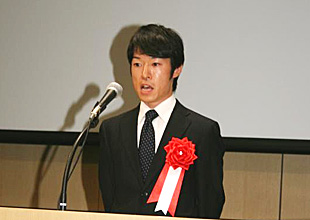 The Winner of the Ninth Asia Pacific Research Prize (Iue Prize) : Dr. Shingo Yoshida
The Winner of the Ninth Asia Pacific Research Prize (Iue Prize) : Dr. Shingo Yoshida
Title of Dissertation : Institutionalization of the Japan-U.S. Alliance : 1963-1978

- Dr. Shingo Yoshida
-
- Career -
Yoshida, Shingo is a research fellow (PD) of the Japan Society for the Promotion of Science (JSPS) and has conducted his research at the Institute for Advanced Studies on Asia, the University of Tokyo since April 2010. He received his B.A. (2004), M.A. (2006), and Ph.D. (2010) from Keio University. Prior to his current position, he was a part-time researcher at the National Institute for Defense Studies, Ministry of Defense (2005-2007) and a research fellow (DC2) of JSPS (2007-2009).
- Summary -
- Institutionalization of the Japan-U.S. Alliance:
1963-1978 -
The purpose of my dissertation is to explore the causal mechanism of institutionalization of the Japan-U.S. alliance in the 1960s and 1970s. Alliance institutionalization is a concept composed of alliance formality and defense coordination. Until the beginning of 1960s, the level of institutionalization of the alliance was quite low. In the period between 1963 and 1978, on the contrary, Japan and the United States started to establish several security consultation channels which form a part of alliance formality and to deepen military coordination between the Self Defense Forces and U.S. Forces as exemplified by the agreement on "the guidelines for Japan-U.S. defense cooperation" in 1978.
Why was the Japan-U.S. alliance institutionalized in the 1960s and 1970s? In this dissertation, I argue that four international changes in the period caused mutual fear between Japan and the United States and that policymakers in both countries institutionalized the alliance in order to cope with the mutual fear. The four international changes consisted of the diffusion of nuclear and economic power in the mid-1960s, decrease of the U.S. military presence in Asia around 1970, the U.S.-China and U.S.-Soviet détente in the first half of the 1970s, and the loss of U.S. superiority in the U.S.-Soviet military balance in the last half of the 1970s.
More precisely, the argument of my dissertation is composed of three points. First, as an effect of the international events in the period, Japan feared that the United States had neither intention nor capability to defend Japan. Second, the United States was concerned that Japan fearing abandoned by the United States might adopt an autonomous politico-military policy of neutralism or nuclearization. Third, to mitigate these uncertainties or mutual fear existing between them, Japan and the United States institutionalized the alliance. Put concretely, they established politico-security consultation channels to decrease uncertainties about the other party's intention and deepened defense coordination to make the alliance strong and to bind each other to the alliance.
In order to substantiate the argument above, my dissertation constructs historical narratives based on published documents, oral history of policymakers, and Japanese and American diplomatic documents I collected at archives in Tokyo and Washington and several Presidential Libraries in the United States.






